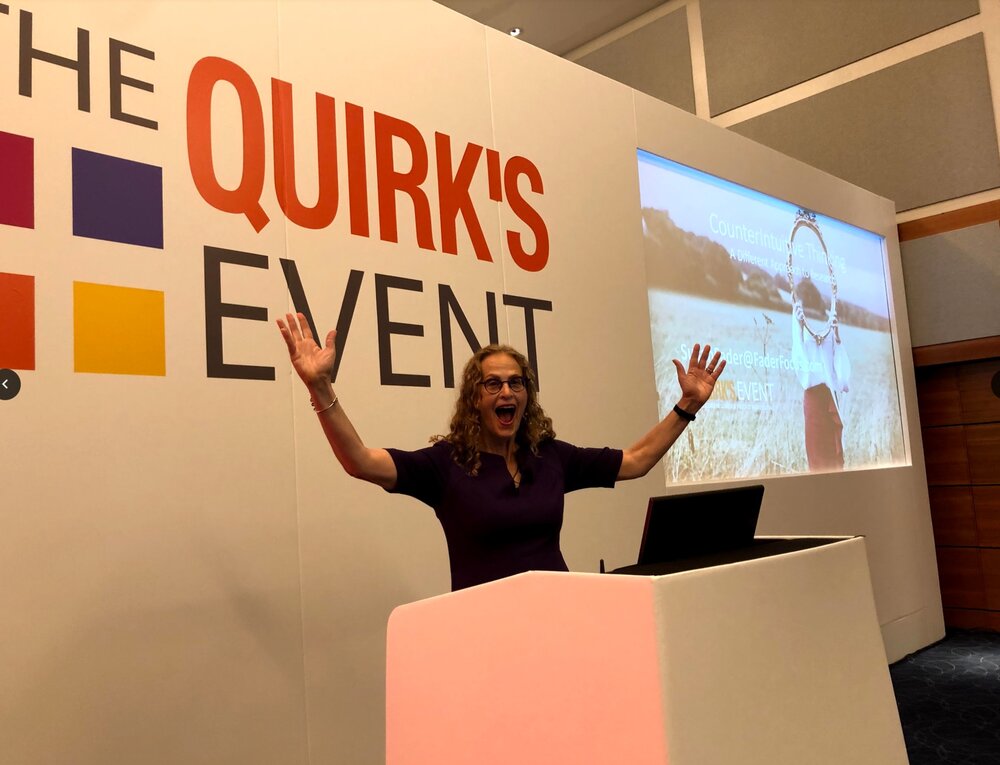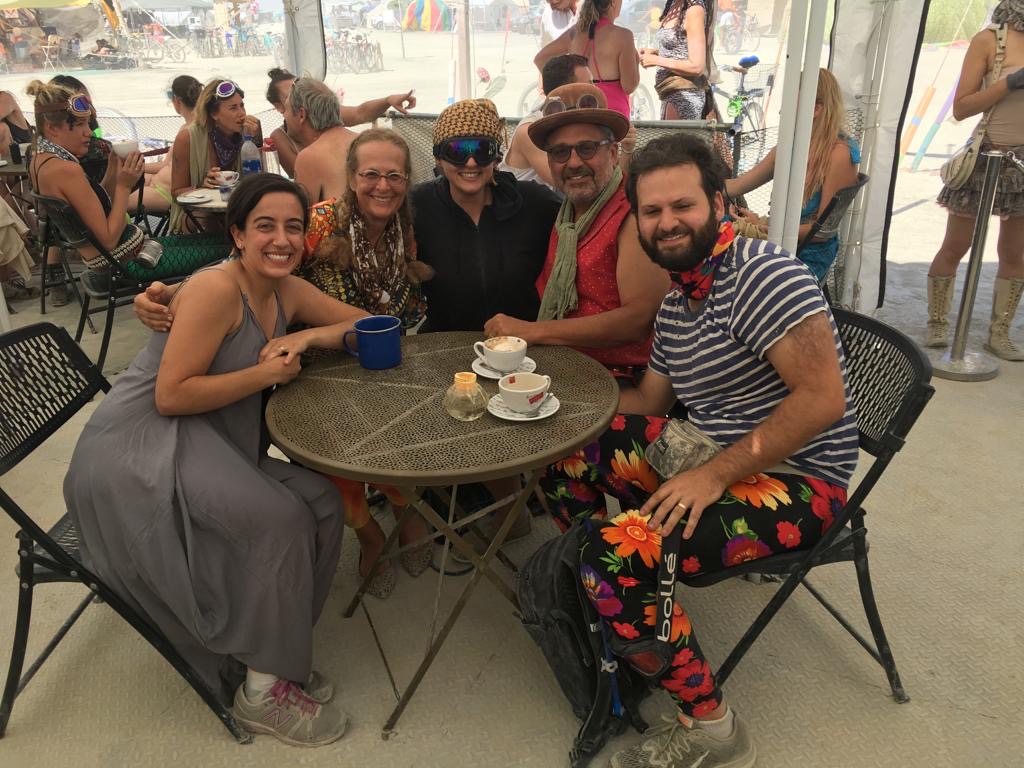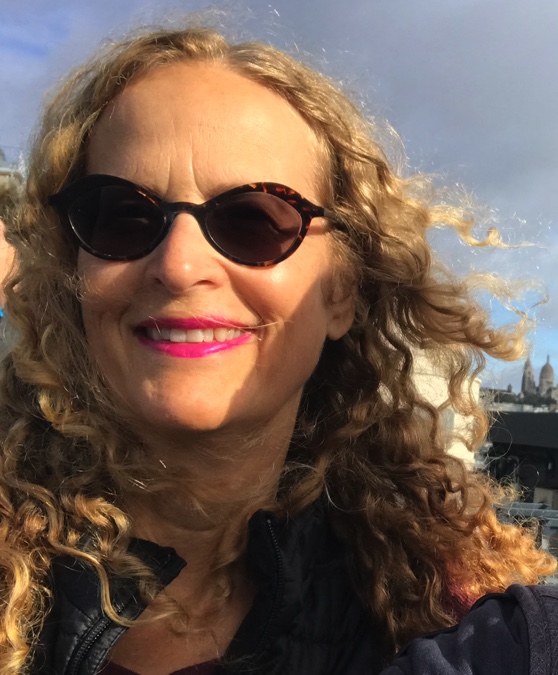How did you get there? Susan Fader

Great to hear from Susan Fader who is recognized in the research world as an innovator and a thought leader in reframing how to think about strategic challenges and opportunities. A master moderator, interviewer and strategist, who believes as we embrace technological innovations we must also challenge the baseline assumptions underpinning how we think about, execute and analyze research. She has conducted research in 30+ countries on 5 continents across a wide range of categories.
Great to catch up Susan, so, how did you get into the industry, and take us through how you got to this point?
Got my MBA from Columbia University and then went the marketing route, as a client on the product management track when companies still had year long training programs where you spent three months in in the field in sales going into stores and doing things like shelf resets, three months in promotion, where I was mentored by the head of promotions, three months working with advertising agency etc… Spent a number of years doing this at General Foods Breakfast Division on Log Cabin Syrup and Alpha-Bits Cereal.
Kids cereal at that time had five different ‘prizes’/promotions per year which required new packaging and advertising so I spent a lot of time in the field with the advertising agency and realized that they had a much more interesting job working on lots of products in many different categories, while I was probably looking at years in breakfast cereal, so I made the move to Interpublic – which, at that time, was the largest advertising agency group in the world. I worked in the New Business/Special Project division and had an absolute blast. Had an amazing boss/mentor Leslie Green who taught me so much. I then had the opportunity to work at a start up advertising agency.
Then my husband was transferred to Tokyo on 2 weeks notice, and off we went with a 6 month old and an almost 3 year old. My husband worked for a Japanese bank, and they provided us with corporate housing, but it was Japanese style, tatami mats, furo, no heat, no western appliances. We lived 3 subways and a bus away from Hiro where the Westerners lived. My son went to Japanese nursey school. I quickly had to learn to read and write the two Japanese phonetic languages, because each day the teachers would write notes that I had to answer.
While in Japan I started consulting to Japanese clients interested in entering the US market and when we came back to the US, I was pregnant with my third child and my husband suggested that I continue my consulting practice because I really was enjoying it and it would probably be hard to get a job in a down market while visibly pregnant. That was an inspired suggestion and that is how I started my qualitative and strategic consulting research practice. For the first 10 years I primarily focused on 4-12 year old research, lots of toys. Then as clients changed jobs, I transitioned into working in many other categories; pharma, financial, travel, entertainment, etc. I have designed, fielded and had feet on the ground research in over 30 countries.
Haven’t looked back.

Do you have any inspiring examples from your career in research where you saw insights make an incredible (game changing) difference to the world, client, brand or society?
Haven’t done any research that is up there with solving cancer, but sharing some interesting examples
Did qualitative research for Marvel as they were transitioning into the world of producing movies and the research I did helped create the bible for 60+ main comic book characters – who would Marvel make movies of first, what the story lines would be, how do you keep comic book loyalists (mostly adult men) happy while still engaging non-comic book readers
Social action – research with Evangelical Christians about how to get them to not be against legislation to protect LGBT from housing and job discrimination. At the time, the Supreme Court had made same sex marriage legal in 50 states, but in over 35 states you could still be fired or thrown out of your rental housing if you were not heterosexual. Challenge was to get people comfortable talking with me about a hot button topic without being defensive and listen so we could uncover where there was a common ground where they would be supportive. Identified the mine fields to stay away from and what messaging resonated.
DEI research – brought into corporation to help them how to do DEI better. My years of moderating and interviewing experience, was able to break down walls to get people to truly share what they felt. While some of the problems were deep, was also able to identify some visible areas where changes could be made and create big positive impact, e.g., in-house HR – instead of out sourcing – employees felt under out-sourcing model -they had nowhere to go if there was a DEI issue.

Career paths are rarely without challenges. Resilience is of course mostly forged from tough moments and many lessons are learnt from mistakes, challenging moments, and/or failed attempts. So, can you share an honest moment from your career when things didn’t go quite according to plan?
When I started working, I was told I couldn’t have a photo of my husband on my desk, because it was not proper to have anything ‘personal’ in the office. Two years later I was voted ‘Superstar of the Year’ of my advertising agency. This was right before I became pregnant with my first child. I went on 6 weeks maternity leave (I was only paid for 4 days, and had to take the other days without pay and I had to fight for 6 weeks, they wanted to only give me 4 weeks). When I came back – the managing director had given away my office, and assigned all my accounts to other people. I was told to sit in a cubicle and ‘help’ junior people until they ‘found’ something for me.
What two things should junior researchers focus on as they progress in their careers?
Focus on networking to learn and continuously open your mind
Research can be very myopic/down the rabbit hole career path – where you ‘learn’ how to do research a certain way and because you don’t have lots of opportunity to see how others do it you can get stuck in thinking a certain way. COVID19 with all the horribleness has also been a unique opportunity to participate in a vast array of online webinars, conferences. Through the chat function on many of these platforms you can reach out and meet new people who you might never have met.
I became the Book Review Editor for QRCA VIEWS magazine so that it would force me to do even more ‘business’ reading than I was doing and help introduce me to new perspectives/ways of thinking.

Do you have any advice for our sector?
There are three stages of research and most of the attention is going into executional and analytical. Not enough is going to the upfront conceptual ‘contextual intelligence’ part where we should be challenging baseline assumptions.
Move away from term ‘market’ research – ie UX is not about marketing – it is about being consumer/user advocates – ‘market’ research keeps us siloed – we need to create one umbrella where qualitative, quantitative, cx, ux, data analytics can all exist under.
How do we ensure that students and those leaving school aspire to join our sector?
By having dynamite <30 year olds like Frankie Lipinski and Maya Kantak being evangelists and role models.
Organizations like QRCA. www.Qrca.org which focuses on bringing in young people and giving them support through grants and education and mentoring.
By moving away from positioning us a ‘data collectors’ and more into consultants/creative listeners and thinkers.

And do you have anyone who has helped your career so far that you’d like to acknowledge and say thanks or give a shout out to?
There are many people – but two amazing women stand out.
Leslie Green – my boss at Marschalk/Interpublic – who was brilliant, tough, demanding, but incredibly patient in teaching and sharing ways of thinking.
Debbie Schlesinger Hellman – who believed I had different perspective and way of thinking about qualitative research and encouraged me to speak and write – without her nudge don’t know if I would have gone done that path.